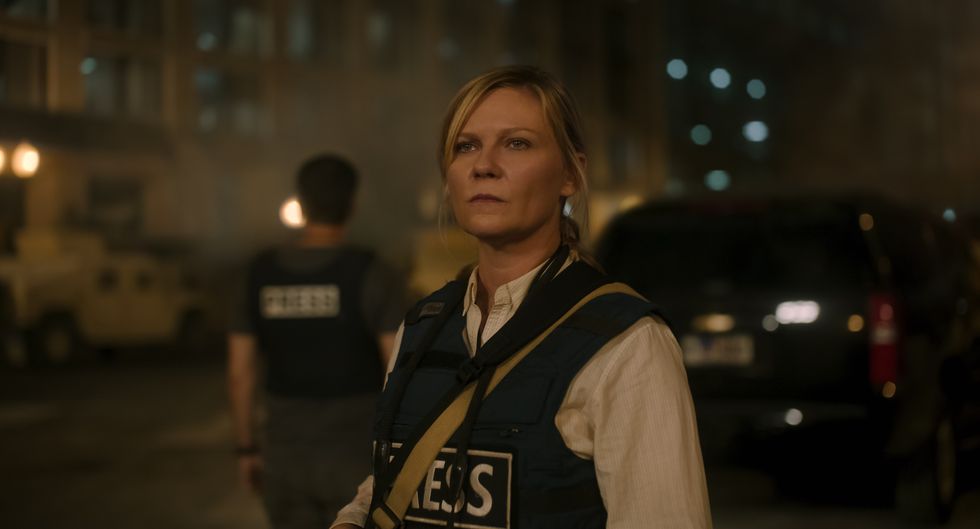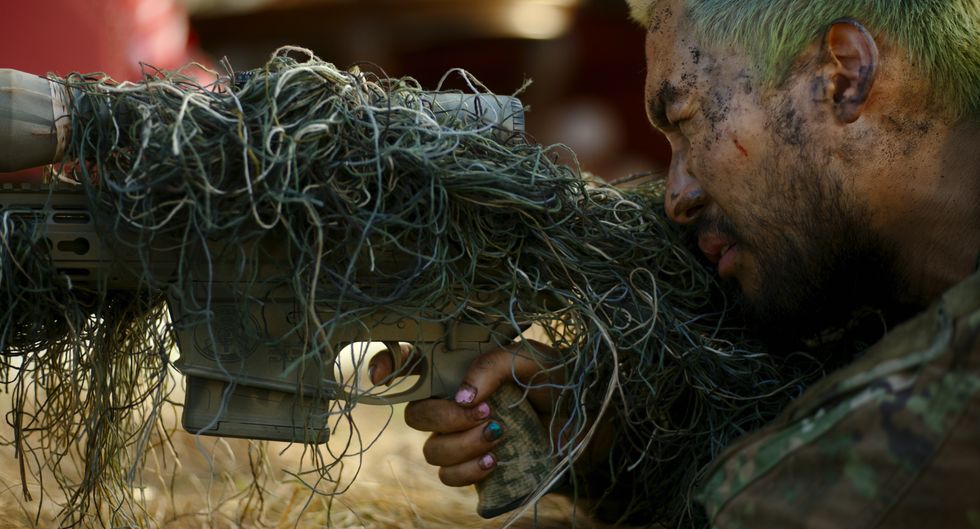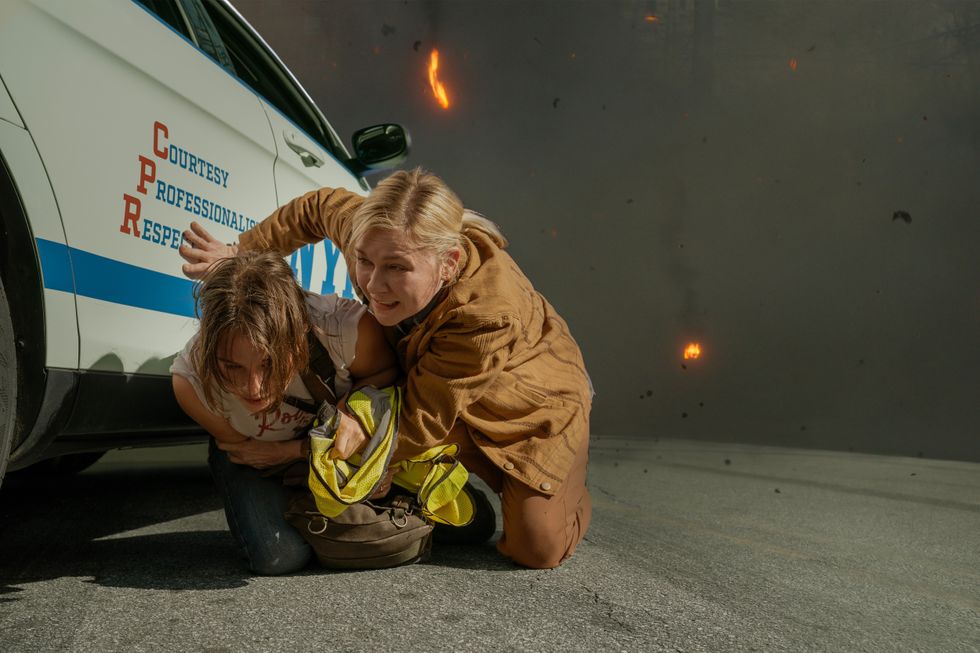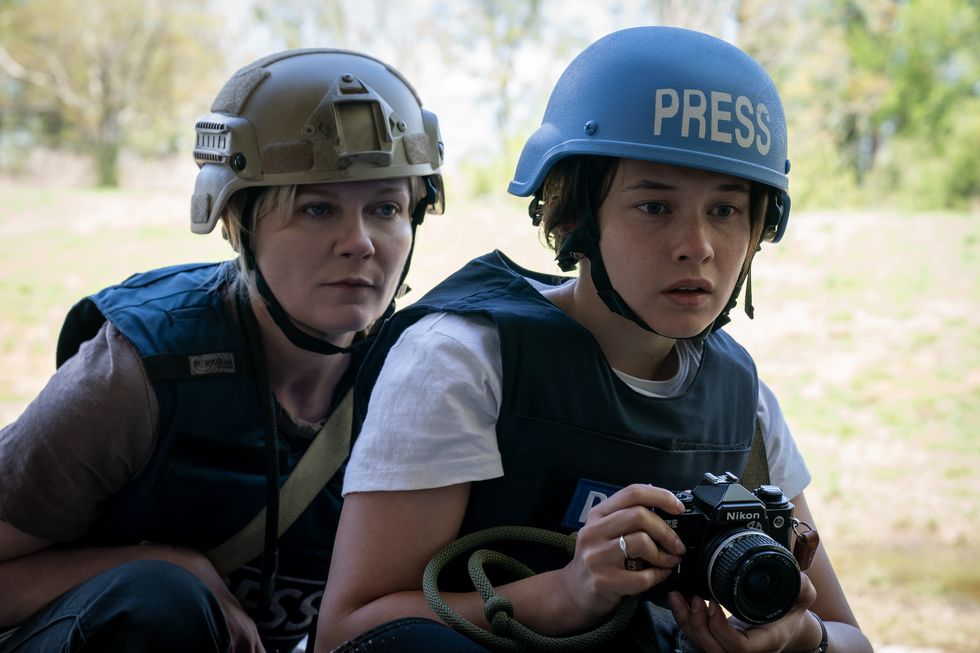Learn How “Building Your Community” Can Help Create a Tribeca-Worthy Indie Feature
Four Samosas writer/director Ravi Kapoor and star Venk Potula break down their South Asian-American comedy, and what it took to get their film into Tribeca film festival.

Following wanna-be rapper Vinny (Venk Potula) and his neighborhood pals as they disrupt his ex-girlfriend’s engagement by stealing her dowry from a supermarket safe, this comedic heist was filmed in the Little India enclave of Artesia in Los Angeles county.
After the film's premiere at Tribeca in 2022, we were able to speak with writer-director Ravi Kapoor and the film’s star, Potula, about how they were able to create this perfectly balanced comedy heist film. The production behind the film, which is now available to stream on IFC Films, is a masterclass in building a filmmaking community within a community.
Both Ravi and Potula, who served as producers on the film, sat down to talk with NFS about how to build your filmmaker community at every stage of your career, making a film that speaks to you, and doubling down on yourself as a creator.
Editor's note: This interview has been edited for length and clarity.
No Film School: Independent film is incredibly difficult, but to do it with style and the comedic prowess that you’ve achieved in Four Samosas is impressive. There wasn’t a single shot that wasn’t a delight. And I want to come back to comedy, but first… You both wore multiple hats on this film — Ravi, as a writer, director, and producer; and Venk, an actor and producer. How did this collaboration come to be, and how did you two know that you'd worked so well together?
Ravi Kapoor: Venk had reached out to me, I think, about eight years ago, maybe six years ago? I can't remember anymore.
Venk Potula: It's gone from six to seven to eight. Next time it will be 19 years ago.
Kapoor: How many years ago was it, was it like two years ago? Maybe it was just two years ago.
Potula: 10 years ago!
Kapoor: Venk had reached out to me for a little kind of mentoring thing, in terms of just understanding the business as a South Asian actor and creator. I started giving Venk feedback on scripts and shorts he was shooting. We became friends and I began to really trust his opinion about the work. I also thought that he'd be an amazing lead in this film I'd begun to write. So I started tailoring it towards Venk as I moved into later drafts. I also knew that Venk was doing a producing an MBA dual–
Potula: I had just started my MBA/MFA dual degree program at Chapman University in Orange County.
Kapoor: So I thought, maybe he can produce this film with me as well. I reached out to Venk and said, "Hey, do you want to be in it and do you want to produce it with me?" Venk had written this narrative podcast called Masala Jones, as well, which I acted in along with my wife Mira, who's also in Four Samosas. We'd already had a little bit of a creative collaboration by that point.
Potula: For me, I never wanted to email somebody like Ravi and be like, "Hey, what am I going to talk [about]?" I felt like I should have something to bring to the table. When I finished UCLA, [where] I studied acting, a big part of my thing was, “Let me make these shorts, let me direct them.” I was making a living as a video editor on Craigslist, just hustling to try and get stuff. Every time I had an opportunity, I made a film, then I sent it to Ravi [to] be like, "Hey, what's your feedback? What are your thoughts?"
When [we] made Masala Jones, which is a scripted podcast, I did it almost as an excuse to be, like, "Let me find a way to work with [Ravi]." The same thing happened with Utkarsh Ambudkar, who we have as an executive producer on the film. I would just send him shorts. I tried to build relationships with people through trying to get better as an artist. I feel very lucky that it happened the way it did.

Potula: A hundred precent.
NFS: Also, we have no shame for film school here at NFS. Actually, I'm a film school dropout, but met my podcast co-host [Charles Haine] because he was my professor at a film school.
Potula: Oh wow. I mean, to be fair, I really didn't want to go to film school. I even asked Ravi, “Do you think I should go?” I asked a lot of people, "Do you think I should do this?" Because everyone told me, “You don't need to go to film school, you're making these shorts and whatnot.” I joke that [film school] was really expensive consulting to help with the film.
NFS: What was the final decision that made you want to pursue your dual degree?
Potula: I felt like I had hit a wall. I was making these shorts, I was getting into festivals, but I just wasn't [growing]. I don't know, it wasn't happening. Then the pandemic happened and I had this feature that I wanted to make, and I thought, "Well now it's never going to happen."
And my family [said], "Well, maybe you should get this MBA."
I had no idea what the benefit was going to be, but I thought if it's three more years [and] I'm taking on all the loans, then I was going to give it another shot. I already had come this far. Even if it wasn't what I wanted, in some ways I thought just a little bit of a lease extending that time to try, like, "Well that's the whole point anyway. If I get to try again in whatever way, then it's probably worth it."
NFS: That's great advice. You both had the opportunity to work together on the podcast. When the feature film became a reality, what was it like transitioning into what started as a sort of mentor-mentee relationship into something that feels like a true partnership and collaboration?
Kapoor: I think it was very organic in many ways. It definitely shifted away from that mentor/mentee kind of relationship and became more and more of a partnership. As I was writing scripts, [Venk] was brilliant at reading them and giving notes and feedback, all the way through the process of getting into raising money and casting and pre-production as well. He was an incredible soundboard for all of those decision makings. I trusted him on an artistic level.
[The shift] happened probably a little bit before we started working on the project. Where I began to go, "Oh, this guy has a really strong sensibility and a strong understanding of the whole process on multiple levels." It shifted pretty fast, I would say.

Kapoor: I knew I wanted to do something a little bit different from Miss India America. With Four Samosas, I wanted to lean into my own sensibilities more strongly, and attempt to make the movie that I would want to see rather than the movie that other people would want to see. That was a big difference for me, in terms of making the second feature. If one or two other people like it, that's great!
I would say the other thing in terms of what I definitely learned with Miss India America was just how important the casting process is, and how big a thing it is to the success of the film. Making sure that you find the right actors to achieve the tone that you're trying to create is important. Otherwise, it can throw everything off. I think we did it really well in terms of both Miss India America and Four Samosas. That was something I do feel proud of is the casting that we did.
NFS: What was the process of rehearsing, and then capturing the comedy for the camera?
Kapoor: Because we were so low budget, we didn't really get much rehearsal at all. We had a makeup test that we had to do for the disguises. That became also our rehearsal period as well for a couple of hours. We got to just read a few of the scenes with just the main cast with the Four Samosas, which was all we could do to create that sense of making sure that we were getting everybody on the same tonal page, in some ways.
Venk and I got to rehearse our scenes together as well, which was great. It helped me get my ya-ya's out because-
Potula: You would be producing, then be, like, "Should we do a rehearsal?" I’d agree, then we just step over and do rehearsal and then come back and send emails or whatever.

Kapoor: Yeah, which is weird. In terms of directing the comedy, something that I realized in one of my previous shorts, with this kind of comedy as well, is making sure that everybody was coming from a place where they knew who the characters were, what their intentions were, what they wanted in life, and making sure everybody was rooted in something so that they could go big. I think the only way that you could go big with this kind of film is if you're rooted in some kind of emotional truth. Especially for Venk's character.
Potula: Comedy is hard. For me, it's always come rather easily. I'm just such a huge fan of comedy. I love Rowan Atkinson. I love Jim Carey. I grew up with that kind of stuff. So, I love physical humor, but it was all in the script, too. It's great when you have a great script as an actor because it's so much easier to bring it to life when it's bubbling already. You just have to lift it off the page instead of you have to dig in and shovel it out of the script.
With this particular role, we discussed a lot about the tone and the world that we're living in. There's a little bit of a heightened reality. There are moments on set where Ravi had to help me lift out of that kind of naturalistic, Stanislavski [method].
I quite have often been told that I'm an animated person. I've often felt that I've had to tone it in, but it was actually really freeing when Ravi lifted that limitation to then go. I think also, the challenge was keeping it rooted, like Ravi said, in an emotional truth, especially with Vinny because he's the conduit through which the audience is going to understand what emotionally is at stake. When you're living in a world of comedy, [you need to make] sure that he still has that pit in his stomach that he feels inadequate. Sometimes feeling inadequate can make you do funny things, and I think that's what happens. That's how this whole thing unfurls.
In terms of performing the comedy, I never tried to go for the joke. Ravi even said that early on, like, "Don't try to make anything funny, just play everything. You're the character that doesn't know he is in a comedy." Which is a great note that Ravi gave earlier. It was actually a relief. I was like, "I don't have to be funny."
NFS: Your character is operating at the top of his intelligence.
Potula: Exactly.
NFS: That comes across during the heist set piece, which I think is such a great contrast. You're operating from that grounded space, but you're in these hilarious costumes that are, by the way, as an ensemble piece. It's just such a joy to see that whole thing unfold.
Kapoor: In some ways, the comedy in Four Samosas comes from the two places. It comes from the performances of the actors and how the scenes were presented. How do we present these moments? The presentation itself was comedic, already, in terms of how we blocked the shots and how we mapped them out, how we put people within the frame, and how we chose to edit the film as well. In some ways, that created its own sense of a comedic tone as well. I think it matched up with the performances that's, I think, that's what helped the film come off the page.

Kapoor: I've been living in LA though for 24 or 25 years, so it's become home and Artesia is the little India of Los Angeles. It's a place that we go and visit when family comes into town, we'll go there for some food and to do a little bit of shopping. It's very much a destination town in Los Angeles because it's a bit of a drive unless you live close by.
What's interesting, and what has always interested me about any Little India, is that they become these little principalities of a homeland that you maybe never knew. It's a way to visit a place that you either came from or your parents came from and get your little dose of culture — a shot on the arm of your motherland. What's fascinating about Artesia, as well, is that it's unlike the Little India you might find in New York or in London, which are kind of bustling places on the streets, is that everything is kind of on the inside because southern California is so hot. In Artesia, everything is happening inside the stores and inside the restaurants.
Artesia always reminded me a little bit of like a western town, in some ways. I could almost imagine the tumbleweed rolling down the streets of Artesia. There are these abandoned railway tracks that cut across it. I was always fascinated by the town itself, and about what the possibilities were visually and artistically there.
In terms of getting the community on board, we couldn't have [made the movie] unless we did. [The Artesia community] was incredible in terms of their generosity, letting us shoot in the stores. The city council let us have a little bit of free rein around the place. We were able to do that by tapping into some groups that were operating there, some business groups, and some people that just knew people. There were two women, in particular, one of our co-executive producers and then one of our associate producers, who just knew everyone and they became our conduit to meeting all the store owners.
I think what sold it for the store owners was they wanted to help us tell a story in their community because they loved Artesia, and they felt maybe this could be valuable to the business world there. I think they just also wanted to help us tell another South Asian American story.
NFS: I know there are many challenges in making a film, but if you had to pick one, what would you say was the biggest challenge of production or the process? How did you overcome it?
Kapoor: Raising financing is always, I think, the hardest thing because it's the first thing. You can't move forward unless you have it. So it becomes the highest, and in some ways the most pressured, aspect because you just can't move forward unless you have it. That was, what I would say, the toughest thing.
In the editing process, what's always interesting for me is maintaining a sense of belief in the project. You're so in it, and you don't know what you have at that point because you haven't really released it to the world. You're sharing it with some people or getting notes, but you have no idea if what you've made is a complete pile of shit or if it might be something of any value to anybody else. In some ways, the toughest thing for me is maintaining belief through the post-production, the editing phase, and trusting that there's still something there.
Potula: I would say for me that the challenge [of] distribution is coming up right now. We're very lucky that we got into Tribeca. We often say that when we got into that festival, it sort of opened a pathway forward in a lot of ways. Without that, it's like who would've known? We have no idea. We were talking about self-distribution, we were trying to figure out other ways.
As hard as it is to get a film made, having it released in a way that people are going to know about it and see it, is a whole other thing in such a crowded marketplace. Even out of Tribeca, it's another challenge to then sell the film, right? Because not every film that goes to Tribeca is sold. I do feel like we try to anticipate all those problems at the beginning stage with our business plan, so we really feel like we're confident that we can try and pull it off even though it's such a hard thing to do.

Kapoor: We brought them in before we started shooting, just before pre-production, knowing that they were going to be brilliant for us when we hit distribution. We had a lot of faith that they could help us out when we got into that phase. They really came through for us on that level. We were happy about that decision [to] get them on early to help us in the distribution process.
NFS: That's something that our audience often doesn't even know to think about. I'm so glad that you guys are bringing it up here. Which brings me to my final question; for somebody who has made shorts in the past, and who is looking towards that indie feature game, that big leap, what advice do you have for somebody who is looking to take the leap?
Potula: I remember I talked with Kathy Yan. She directed this movie called Dead Pigs and won the Sundance Ensemble award, then she directed Birds of Prey. I made the short film that I had directed, acted in, edited, and produced called Woke. So, we were there, at a festival in San Francisco called CamFest. I saw this movie, and it was [Yan’s] directorial debut, it was Dead Pigs, and it was brilliant. It was an amazing movie. I thought, "Wow, hadn't she just made shorts before?" I was so impressed and surprised, how did she go from making shorts to making this huge feature?
I asked her that question and her answer was, "All you really have to worry about are your department heads, your first AD, and your cast." Whether it's a short film or it's a feature, the team that you build is going to be the same no matter what the scale is. If you are confident in that team and in the people that you bring together to help bring your vision to life, then that's where the confidence should start. Don't let the scale intimidate you, is what I took from that.
Kapoor: Lean in and trust your individual voice. Attempt to make as much of the movie that you want to make as you possibly can. There are always compromises that you're going to have to make. But keep trying to create that movie that you really want to see.
Potula: Something else I always say is "Start small, but start. Start small, but follow through. And start small and never give up."
Kapoor: You've got to build your community. Find the tribe that's going to help you and find the support. Fill your world with people that I believe in you.
Potula and Apple Maps have teamed up for an activation to promote local businesses. When you search Venk Potula’s name in the app, you can find ten Indian restaurant recommendations from Venk— four of them are in Artesia! Check out the movie, then check out these spots!
















